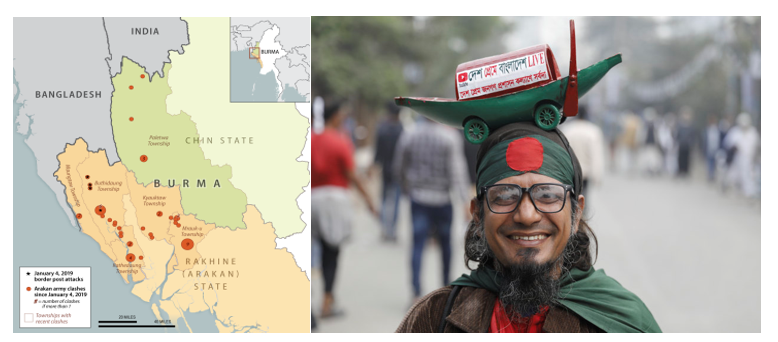Can a New Government in Dhaka Bring Better Relations with Arakan?
- globalarakannetwork

- Nov 15, 2025
- 3 min read
Kyaw Zann, Opinion
Global Arakan Network November 15, 2025

The countdown to Dhaka’s February 2026 polls echoes across the Naf like distant thunder, stirring the salt-soaked air of our coastal villages. We do not speak of “democracy” in the abstract; instead, we speak of rice that no longer crosses the river, of clinics that have been shuttered by sealed borders, and of sons who vanished into the camps only to return with Kalashnikovs instead of diplomas. The Awami League’s ban, though merely a footnote in distant headlines, serves as the latest chapter in a saga of exclusion: another neighbor rewriting its rules while our fate hangs in the balance.
Our frontier with Bangladesh is not a line on a map but a living wound—270 kilometers of mangrove and mud where families once traded betel for dried shrimp under the same moon. Today, concrete pillars and razor coils mark the scar. The blockade, which was imposed in the name of political leverage, starves both banks.
Our markets in Maungdaw echo with empty stalls; their bazaars in Teknaf mourn the same silence. Beyond the wire, the camps metastasize. Those who fled the 2017 inferno—torched homes, mass graves, the smoke that still lingers in nightmares—discover that exile is not sanctuary but incubation. DGFI whispers in one ear, BGB in the other; ARSA recruiters prowl the latrines at dusk. A generation that was raised on powdered milk and propaganda learns that return is a myth and that resistance is a salary. Each new militia banner that is unfurled in the camps becomes a tax we pay in blood for Dhaka’s indecision.

A BNP triumph, should the votes align, dangles the promise of pragmatism. Their cadres speak of reopening the Sabrang gate, of joint patrols that protect rather than plunder, and of repatriation with dignity rather than deportation at gunpoint. We have heard such tunes before—under Hasina, under Ershad, and under every regime that courted votes in exile only to forget us at the border.
The difference now lies in the shadow cast by the generals. Bangladesh’s security apparatus, which has been fattened on smuggling royalties and refugee extortion, views liberalization as amputation. Politicians may ink agreements on mahogany tables; field commanders tear them up in the mangroves. The real election, then, is not in February but in the barracks: can civilian will outrank epaulettes?
We do not ask for miracles—only for the mundane mercies that once defined neighborliness. Let the women of Kyainchaung sell their ngapi to Ukhia without paying bribes. Let the sick cross for treatment without drowning in paperwork. Let boats fish beyond the three-mile curse under legal permission without courting martyrdom. These are not concessions; they are the basic arithmetic of survival. A government in Dhaka that cannot enforce such simplicities against its own praetorians is a less of the government.
The river keeps its counsel, carrying downstream the flotsam of broken accords: rusted repatriation forms, spent cartridges, and the occasional corpse that is snagged on reeds. We watch from our side, calloused hands gripping the fence, knowing that ballots in distant cities change little when the gatekeepers remain the same.
February may anoint a new face in the Bangladeshi capital, but peace will arrive only when that face dares to stare down the uniforms and demand the keys. Until then, the camps will swell, the nets will rot, and the Naf will continue its ancient work—eroding borders faster than any election can redraw them.




_edited.png)


